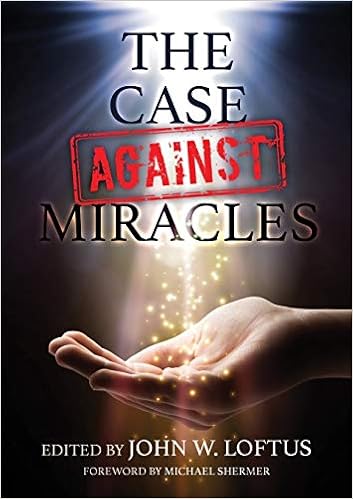
I am currently reviewing the book, The Case Against Miracles, hot off the presses, edited by atheist counter-apologist John Loftus, with multiple authors. So far, it is very good.
From the Introduction:
What if there really was sufficient objective evidence for the miracles of the Christian faith? Then there would never be any different apologetics method to defend the Christian faith other than evidentialism—which claims to have sufficient evidence for these miracles. The fact that eighty percent of Christian apologists reject evidentialism in favor of four different methods [Classical Apologetics, Presuppositionalism, Fideism, Cumulative Case Method] is proof all on its own, that even Christian apologists don’t think there is sufficient objective evidence for their miracle claims.
–John Loftus, page 19
The Five Different Methods of Christian Apologetics (from chapter 6):
Evidentialism: the use of reasoning to defend Christianity based primarily on the requirement for sufficient objective evidence.
evidentialists: Josh McDowell, John Warwick Montgomery, Gary Habermas,
Classical Apologetics (Natural Theology): Assumed to be the method used by most theologians in earlier centuries, especially Thomas Equinas. Norman Geisler was the first evangelical to see the failure of evidentialism. …Geisler argued apologists should revert to the old-time abandoned (for the most part) Catholic type of apologetics, stemming from the classical theists, especially Thomas Aquinas.
[This] classical method has two-steps. The first step is to defend the theistic proofs for the existence of God. The second step is to provide the evidence that Christianity is true. Apologists must first effectively argue for the existence of [the] God of theism, generally speaking, who created the universe. Then after successfully doing so, they must provide sufficient objective evidence that Christianity is the true theistic religion. If the first step cannot be done effectively their whole apologetic fails.
classical apologists: RC Sproul, Peter Kreeft, JP Moreland, William Lane Craig
Presuppositionalism: [These] Christian defenders simply presuppose their god exists (or even their type of Christianity as a whole), without objective evidence or arguments to the existence of God. Presuppositionalists reject the evidentialist method. They admit that there isn’t sufficient evidence to convince non-believing outsiders for Christianity.
…The presuppositionalist argues that non-believers who use reason and logic to defend their worldview cannot do so without assuming the Christian worldview. Only Christianity can justify the use of reason and logic. Non-believers must therefore presuppose Christianity even as they argue against it.
In the presuppositionalist’s mind unless the evidence is viewed through Christian presuppostions it’s not considered evidence at all. The task of the [presuppositionalist] apologist is to destroy false presuppositions so non-believers can adopt the presuppositions of Christianity and believe.
presuppositionalists: Cornelius Van Til, Francis Schaeffer, John Frame, Alvin Plantinga
Fideism: [This type of apologist] agrees that there isn’t sufficient evidence to believe. In its place is the biblical concept of faithful witness. “Our task as Christians is not to know the truth intellectually but to become the truth.” Proponents [of this method] do not hold that the truth of Christianity must be presupposed, but rather that it must be experienced.
fideists: Soren Kierkeegaard, Karl Barth, Myron Penner
Cumulative Case Method (Eclectic): this method supposedly takes the best of each of the other methods by combining them all together into one.
The reason apologists are being forced into this approach is because they realize none of the other approaches can be justified. This is their last hope in defending that which cannot be defended at all. They rightly reject Evidentialism because it leads people away from Christianity. …An eclectic method is one where the conclusion largely dictates the method.
eclectics: CS Lewis, Richard Swineburne, Robert Bowman, Jr., Douglas Groothuis
A quote from Christian apologists H. Wayne House and Dennis W. Jowers in their book, Reasons for Our Hope:
Several approaches are available to apologists, from classical to evidential to presuppositional to fideist. Each has strengths and weaknesses, and each presents valid and useful apologetics. The Christian apologist, then, needs to understand each approach thoroughly and glean the best from each of them. Further, the apologist needs to be able to employ different approaches in different contexts. Every person will react and be reached differently, so there is no one approach that will work every time. [Emphasis, John Loftus’]
Gary: Wow!!! If that isn’t a blatant admission of the weakness of the evidence for Christianity, I don’t know what is! Many Christian apologists claim that the evidence for the resurrection of Jesus (their central historical claim) is as strong or stronger than the evidence for any other ancient historical event, such as Julius Caesar’s crossing of the Rubicon! The above admission by House and Jowers demonstrates this claim to be an apologetic ruse…or a blatant lie.
End of post.
To be successful is to be able to play whack-a-mole in the style of Gish Gallup. When all five styles are exhausted, then resort to name calling and criticism without identifying what’s in error.
I had a guy on my blog last week that says he just knows it’s true. He has to think that since it’s all There is.
LikeLiked by 2 people
BINGO! That is always the ultimate byproduct from Apologists in TRYING to reveal the bogusness of their 4th-century Canonical New Testament and the very seedlings that made the first roots of Christology/Christianity. Since they know nothing of these original soils and seedlings, they resort to personal attacks on the questioning, challenging non-Theists and non-Christians. They should actually just shut-up, remain silent rather than undermining their own mythological ideology.
LikeLiked by 1 person